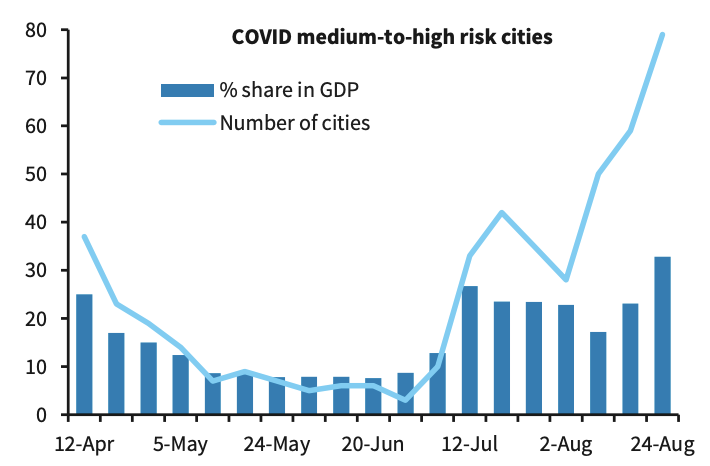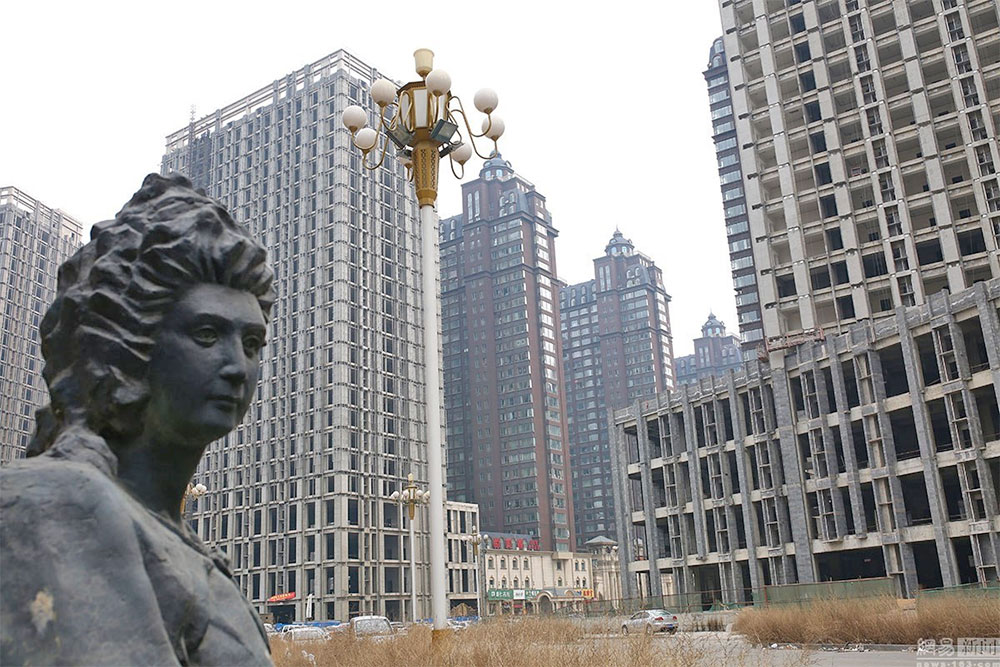Three sectors to watch as China battles its "perfect storm"
This time next month, the world's second-largest economy will likely undergo its most radical change in half a century. Current President Xi Jinping is likely to become the first leader in China's modern era to stretch his leadership to a third five-year term. It may also be much longer after the Chinese Communist Party removed the two-term limit imposed on leaders in 2018. But as the second term rolls into the third, Xi and his new Politburo will face a slew of economic and social challenges:
- Slowing economic growth, as a result of COVID-zero lockdowns and the country's demographic decline
- A housing crisis leading to consumer revolt, a US$30 billion bailout program, and one giant headache for near-bankrupt developers
- A nationwide drought that could lead to a broader food crisis, and
- A new battleground in Taiwan which the US is keen to capitalise on
All this comes as China enters that "new era" - a forthcoming period described in a recent South China Morning Post feature as a one-man challenge:
China is at a critical stage of development. Over the past decade, the economy has grown steadily and the country is now on the cusp of joining the high-income club.
How well China navigates these challenges will largely be down to Xi, who has reshaped the country’s major economic decision-making institutions.
In this wire, I will look at the challenges facing the Chinese economy and investigate whether there are any opportunities that may arise from it. We'll look at the changing thesis for Chinese assets and discuss what Australian investors need to be cognisant of, even if you don't play politics or have direct exposure to the tiger economy.
Stubborn or defiant? Understanding China's COVID-zero policy
Economists have been arguing for some time now that the biggest risk to China's ambitions is its zero-COVID policy. In the last two weeks alone, reporting in the Caixin magazine suggested more than 100 cities currently are battling COVID outbreaks. Of those more than 100 cities, at least 70 have been in partial or full lockdown in the last two weeks, with the mega-city of Chengdu the most notable.
These same lockdowns have also spurred a slew of GDP downgrades for the tiger economy. Three weeks ago, ING cut its 2022 growth forecast to just 4%. Last week, Goldman Sachs and Nomura both cut their forecasts - Goldmans is now at 3%, while Nomura is at an even more bearish 2.8%. And Stella Xie of the Wall Street Journal wrote an article asking whether China's zero-COVID policy just cost its government the long-term ambition to overtake the US as the world's largest economy.
So what will be more important this October? The number one title or eliminating COVID-19?
Chi Lo, a senior market strategist at BNP Paribas Asset Management in Hong Kong, says we won't see a deviation from this policy next month.
"Nope. Not at all. Not a chance," Lo tells me. "They don't really want to change it, by our guess, until March next year."
Lo's explanation for why he is so certain about the non-pivot is three-fold. First, political inertia is "very thick" given this conference will feature the biggest names (and most important images) in Chinese politics. The other two reasons are far less well known.
"Practically, it's difficult to move the policy much in the short term because the vaccination rate of old people is very low - still less than 40%. You can argue China is the victim of its own success," Lo says.
He also says that the time lag for Chinese scientists to develop their own vaccines is important, given Beijing's disinterest in taking vaccines produced from other nations. Unfortunately for the government, only two of the 12 vaccine candidates are in late-stage trials and none of them are officially approved yet. The delays could add six to eight more months to the process.
"Beijing doesn't really have the confidence to move away from the zero-COVID policy," Lo adds.
On the data front, the recent Caixin composite PMI read moderated for the second consecutive month in August. Barclays analysts have argued that the weakness in the August PMIs reflects the effect of all the economy's headwinds - but mostly zero COVID. Analysts will be looking for any relaxation of this policy on 16 October. But the number of high-risk regions, as shown in this next chart, suggests that may still be an aspiration:

So, how would a relaxation of this policy affect investing in the country?
A relaxation will allow people to get back to their normal lives and business people will invest money with greater confidence. Economic activities will pick up and in the context of an extremely cheap market, it can be interesting, explains Dr Joseph Lai of Ox Capital Management.
The $60 trillion question
The other major crisis confronting the Xi-Li administration this October will be the state of unfinished and unpaid properties. No one knows yet how the government will face the property crisis.
Footage of ghost cities exploding has circulated online, just as hundreds of homeowners threaten to not pay their outstanding mortgages. Data collated by The Conversation says that figure could be in excess of US$370 billion. Livewire's David Thornton has already written about the government's approval of a near-US$30 billion batch of loans to bail out (or in China's words, "assist") affected companies in a bid to finish those projects.

But perhaps the biggest impact of the housing crisis so far is what fiscal and monetary authorities have had to do in the wider economy to keep the faith. As recently as a fortnight ago, the Chinese government shaved more off the country's key lending rate (known as the five-year loan prime rate). That rate is now 4.3%, but it means that mortgages still have a 4%+ interest rate on repayments - a tough pill to swallow especially if you don't live in the building you bought.
So is there more stimulus on the way? Can they afford not to distribute more money into the economy? Lo argues that the Chinese government can handle the "perfect storm" it is now in - but that you also shouldn't get your hopes up.
"Don't expect wholesale bailout, but there may be selective bailout," Lo says. "If one is hoping for a big bailout like after the GFC, then no way."
He adds that caution has to be the name of Beijing's game, given that there is a myriad of policy mistakes that can be made. After all, spiralling growth is still a very real risk even if it's not quite every economist's base case.
"Part of that forceful fiscal spending, in our expectation, will go to the property market. In terms of using public funds to buy up bad assets to kickstart projects again so they can be delivered and homebuyers will start paying mortgages again," Lo says.
Lai also argues that stimulus is on its way but suggests a reversal of the zero-COVID policy may have a greater positive effect than a pure cash splash.
"Confidence to spend can be improved by reversal of covid-zero policy, stabilisation of the property market, and an improvement in the geopolitical situation with the US. On the balance of probabilities, some of all of these will indeed be reversed in coming 12 months."
Having said this, any measure to boost infrastructure spending is great news for the Australian dollar and Australian assets exposed to China (read: the major iron ore miners). Lai agrees the scale won't be the same as post-2008, but that any fiscal assistance can help investor confidence even "at the margin".
Chipping away: The other big battleground for Beijing
But if drought, property, COVID-19, and even high youth unemployment were not enough to ruffle Xi Jinping's feathers, Taiwan certainly has. US House Speaker Nancy Pelosi's visit to Taiwan in August created a stir all around the world, even if it was the worst kept secret in geopolitics. Since then, the US Congress has passed a resolution gifting Taiwan more than $1 billion in weapons in case Beijing decides to launch a hot war. Behind the scenes, the White House continues to mull more restrictions over Chinese technology investment in the US - a legacy of the Trump administration's restrictions on Chinese public listings stateside.
So will Xi and the leadership team address this thorn next month? Not yet, says Lo.
"I don't think the Party Congress will say anything about Taiwan. If they do, nothing is going to be new," Lo says. "The last thing they want to do is to open another can of worms."
Investing opportunities in China
But a non-mention of Taiwan does not necessarily mean Chinese technology is uninvestable. In fact, Lo believes the opposite so long as you have time and patience on your side.
"The tech sector, short-term, is still a no-go. It's still undergoing a regime change, which moved from 20 years ago with no regulation now to a regime with regulations to properly supervise its development."
Lo also continues to back the commodities trade long-term, though you have to accept the outsized returns of 10-15 years ago most likely evaporated last year.
"There is still demand from China. As far as this cycle is concerned, the fiscal policy will have to do the heavy lifting. A lot of that spending still focuses on infrastructure and construction."
Wenli Zheng, Portfolio Manager of the T. Rowe Price China Evolution Equity Strategy argues that there are bottom-up opportunities in the Chinese stock market for the right investor. The core of Zheng's thesis is that he believes we've seen the worst of the economic slump.
"China's equity market is broad and deep and as long as the economy stabilises, there are ample bottom-up opportunities for investors," Zheng says.
While Taiwan's chip manufacturing woes remain just that in the short term, Zheng argues that the wider EV and automobile supply chain could be a long-term opportunity for alpha generation. And that's not the only opportunity he sees.
"The local substitution is accelerating in medical devices, automation equipment, and semiconductors ... local consumer brands are gaining share by addressing changing consumer preferences."
Lai backs the semiconductor trade as well, adding TSMC (TPE: 2330) is still the most capable of all the manufacturers. But he sees a different and much larger opportunity in targeting companies that won't be impacted heavily by the ongoing economic transition.
"Companies like AK Medical will see its earnings growing at 20-30% a year for a very long time. Valuation has come down with the market. There are quite a few of these names worth picking up in times of market volatility."
Never miss an insight
If you're not an existing Livewire subscriber you can sign up to get free access to investment ideas and strategies from Australia's leading investors.
I'll be in charge of asking the questions to Australia's best strategists, economists, and fixed income fund managers. If you have questions of your own, flick us an email: content@livewiremarkets.com
4 topics
2 contributors mentioned

